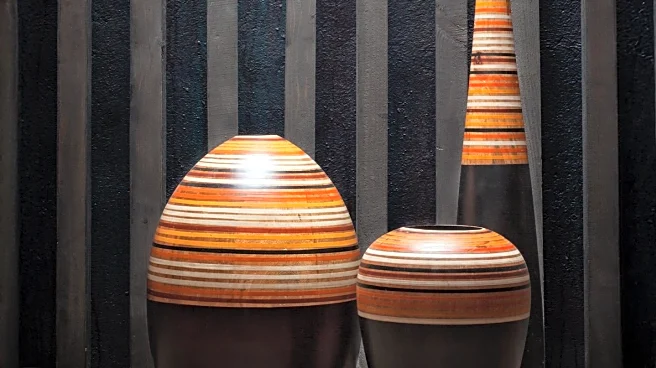What's Happening?
The Waurá people, an Indigenous community in Brazil, are facing challenges in maintaining their ancestral pottery practices due to climate change. The worsening dry spells have affected the production of cauxi, a freshwater sponge mixed with riverbed clay to create ceramics. Yakuwipu Waurá, an Indigenous leader, highlighted that the river's reduced rise period has hindered cauxi growth, making it difficult to source the material. This ecological shift has increased the cost of producing ceramics, which are central to Waurá culture and identity. The community's pottery, used for various purposes, is crafted by women using materials collected by men from the river. Recent workshops in São Paulo aimed to raise awareness about the impact of climate change on Indigenous traditions.
Why It's Important?
The threat to the Waurá's pottery tradition underscores the broader impact of climate change on cultural heritage and Indigenous ways of life. As climate change alters ecosystems, communities reliant on natural resources face existential threats. The Waurá's situation highlights the vulnerability of Indigenous practices to environmental changes, emphasizing the need for global action to mitigate climate impacts. The loss of such traditions not only affects cultural identity but also poses economic challenges, as these practices often contribute to local economies. The Waurá's plight serves as a reminder of the interconnectedness of environmental health and cultural preservation.
What's Next?
The Waurá community's efforts to raise awareness about climate change impacts may lead to increased advocacy and support for Indigenous rights and environmental protection. Potential collaborations with environmental organizations could help develop strategies to preserve their pottery tradition. Additionally, the Brazilian government may face pressure to address deforestation and climate change more effectively, considering its impact on Indigenous communities. The Waurá's situation could inspire broader discussions on sustainable practices and the importance of preserving cultural heritage in the face of environmental challenges.
Beyond the Headlines
The Waurá's struggle highlights ethical considerations regarding environmental stewardship and the responsibility of industrialized nations in contributing to climate change. It raises questions about the balance between development and conservation, particularly in regions rich in biodiversity and cultural heritage. The situation also reflects the broader issue of Indigenous communities bearing the brunt of environmental degradation caused by external factors. Long-term shifts in climate patterns could lead to further cultural losses, emphasizing the need for inclusive policies that prioritize Indigenous voices in climate action.










